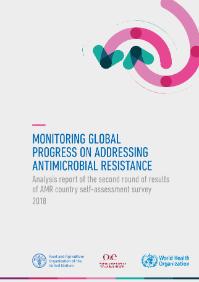Monitoring global progress on addressing antimicrobial resistance: analysis report of the second round of results of AMR country self-assessment survey 2018
 Countries are making significant steps in tackling antimicrobial resistance (AMR), but serious gaps remain and require urgent action, according to a report released by the Food and Agriculture Organization of the United Nations (FAO), World Organisation for Animal Health (OIE) and the World Health Organization (WHO). The report charts progress in 154 countries and reveals wide discrepancies. Some, including many European countries, have been working on AMR policies in human and animal sectors for more than 4 decades. Others have only recently started to take action to contain this growing threat. Progress in developing and implementing plans is greater in high-income than low-income countries but all countries have scope for improvement. No country reports sustained capacity at scale in all areas. The report looks at surveillance, education, monitoring and regulating consumption and use of antimicrobials in human health, animal health and production, as well as plants and the environment - as recommended in the Global Action Plan published in 2015.
Countries are making significant steps in tackling antimicrobial resistance (AMR), but serious gaps remain and require urgent action, according to a report released by the Food and Agriculture Organization of the United Nations (FAO), World Organisation for Animal Health (OIE) and the World Health Organization (WHO). The report charts progress in 154 countries and reveals wide discrepancies. Some, including many European countries, have been working on AMR policies in human and animal sectors for more than 4 decades. Others have only recently started to take action to contain this growing threat. Progress in developing and implementing plans is greater in high-income than low-income countries but all countries have scope for improvement. No country reports sustained capacity at scale in all areas. The report looks at surveillance, education, monitoring and regulating consumption and use of antimicrobials in human health, animal health and production, as well as plants and the environment - as recommended in the Global Action Plan published in 2015.
